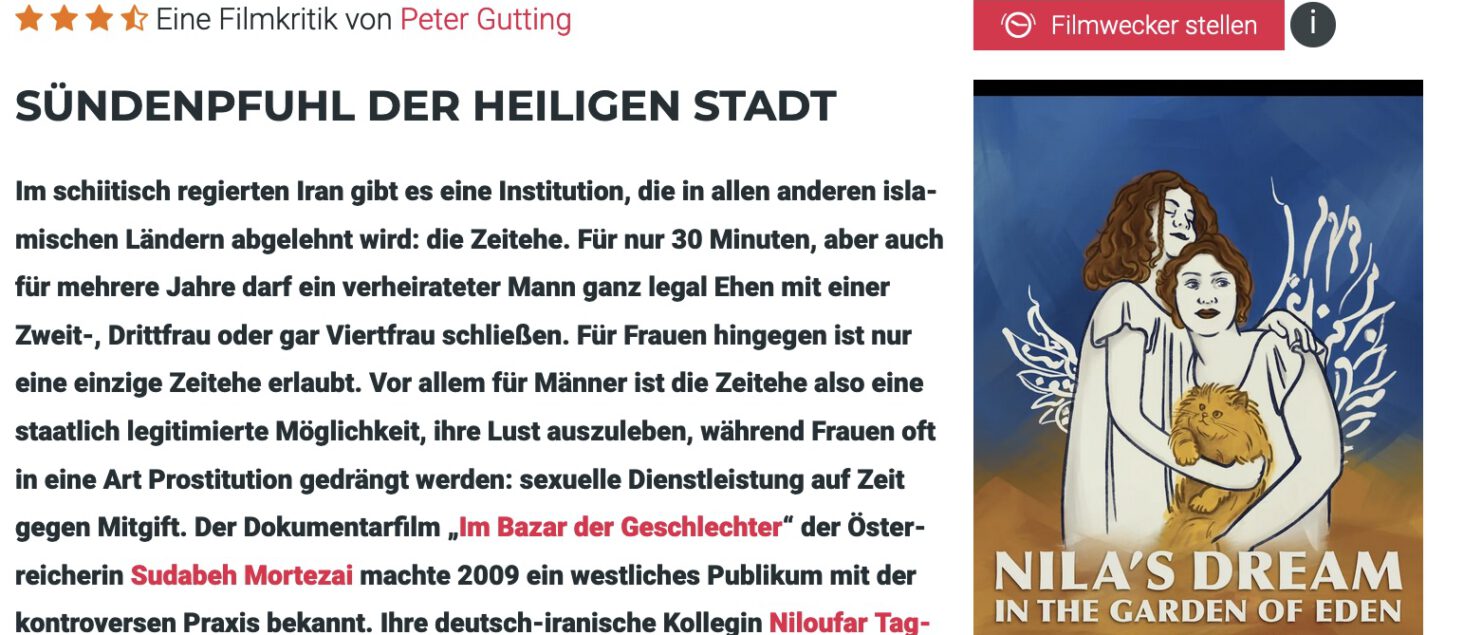The den of iniquity in the holy city (review)
NILA’S DREAM IN THE GARDEN OF EDEN (2023)
A film review by Peter Gutting
DEN OF INIQUITY IN THE HOLY CITY
In Shia-ruled Iran, there is an institution that is rejected in all other Islamic countries: temporary marriage. A married man can legally marry a second, third or even fourth wife for just 30 minutes, but also for several years. For women, on the other hand, only one temporary marriage is permitted. For men in particular, temporary marriage is therefore a state-legitimised opportunity to live out their lust, while women are often forced into a kind of prostitution: temporary sexual service in exchange for a dowry. The documentary film “Im Bazar der Geschlechter” by Austrian Sudabeh Mortezai introduced Western audiences to this controversial practice in 2009. Her German-Iranian colleague Niloufar Taghizadeh now sheds light on the scandal that the children of such temporary marriages often suffer. They are considered virtually non-existent, are not allowed to attend school and receive no medical care.
Nila is a bright girl. She looks into the camera with curious eyes and talks open-heartedly about her dreams. The six-year-old with the luscious curls loves to dance and adores her cat. But she is not allowed to go to school, even though she has already taught herself the numbers. Nila’s father takes no responsibility whatsoever for the child born of a temporary marriage. He simply denies the relationship with Nila’s mother Leyla and thus the paternity, because a temporary marriage can, but does not have to be registered by a clergyman.
Leyla has been fighting for her daughter’s rights in court for six years, so far in vain. Only if the father recognises the child is it considered legitimate and receives a birth certificate. However, if the father simply absconds, he benefits from a loophole in Iranian law. There are no illegitimate children in the land of the mullahs, at least not officially. After all, sex between unmarried people is forbidden and is sometimes punished draconically with stoning.
A cleric talks bluntly on television about why temporary marriage is allowed at all. Lust is a need, just like hunger or thirst, he lectures. But women are not always available because of illness or menstruation or because men have to go on a long journey. If temporary marriage were not permitted, this would lead to prostitution, according to the theory of the spiritual rulers.
However, the “oldest trade” also exists, especially in the holy pilgrimage city of Mashhad, where the film is set. Here, for example, a serial killer was up to mischief, murdering rows of prostitutes, sometimes with the connivance or even approval of the authorities. The thriller Holy Spider (2022) by Ali Abbasi is based on these facts, which raise questions similar to those in Nila’s Dream in the Garden of Eden: Why does “sin” actually celebrate happy holidays in a holy place like the metropolis of millions? Mashhad, like the equally holy city of Qom, is notorious for a particularly high number of marriages.
Nila’s mother Leyla often laughs in this film, but sometimes she can’t hold back her tears. For example, when she talks about the court. The father of the child was allowed to call her a whore with impunity. And the judge said her daughter was a bastard. Despite this, Leyla keeps going back to court and has already had to deal with three different judges. Her persistence and inner overcoming finally paid off. Shortly before Nila’s seventh birthday, a DNA test leads to the judgement that the man from the temporary marriage is undoubtedly the father. Nila is allowed to go to school with the other children.
Thanks to secret recordings, we viewers experience what happens there at first hand, whereas previously we only learnt about the scenes from the justice system from Leyla’s descriptions. Leyla is suddenly asked to provide a custody certificate that can only be signed by the father, who has been in denial about his child for seven years and has never seen him. The mother is sent from one office to the next. It is a hurdle race that Franz Kafka could hardly have invented more grotesquely. In order to be able to document it in every single step with a hidden camera, the filmmaker and those involved risked “more than their freedom”, as it says in the opening credits.
However, not every dodge of the excessive bureaucracy can be understood from a Western layman’s perspective. The film would have benefited from a commentary by director Niloufar Taghizadeh, who also grew up in Mashhad and was one of Leyla’s classmates. In other moments, however, the concept of the courageous and women-politically important documentary is convincing. Especially when it contrasts the factually harrowing reality with the joy of life of mother and daughter, captured in poetic city shots of glittering seas of light, colourful kites in the sky and dreams of flying, which run through the film like a common thread. The director did not want to show Leyla and Nila as victims, but as humorous people whose hopes and aspirations allow them to emerge stronger from discrimination and hostility. We can probably take a leaf out of their book here in the spoilt West.
from kino-zeit.de from 4.4.2024


